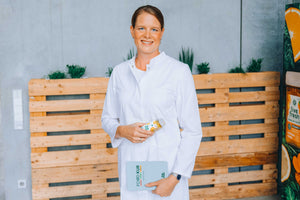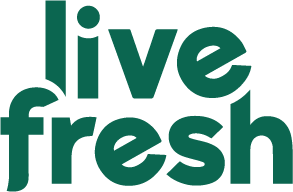Ob Muskelaufbau, Sättigung oder Zellregeneration – ohne Protein läuft im Körper nichts. Kein Wunder also, dass viele sich fragen: Wo steckt eigentlich Eiweiß drin? Und welche natürlichen Proteinquellen sind wirklich sinnvoll für Deine Ernährung?
In diesem Artikel zeige ich Dir die besten eiweißreichen Lebensmittel – aus pflanzlicher und tierischer Herkunft – plus Tipps, wie Du sie einfach in Deinen Alltag integrierst. Bonus: Leckere Ideen für schnelle Rezepte, die richtig was draufhaben!
Highlights
- Natürliche Proteinquellen wie Fleisch, Fisch, Eier, Hülsenfrüchte und Nüsse liefern Eiweiß plus wertvolle Nährstoffe – ideal für Muskelaufbau und Sättigung.
- Wer sich fragt "Wo sind Proteine drin?" findet Eiweiß in vielen Lebensmitteln – je naturbelassener, desto besser für die Gesundheit.
- Vegane Proteinquellen wie Tofu, Linsen, Tempeh oder Kürbiskerne decken mit Vielfalt und Kombinationen den täglichen Proteinbedarf.
- Pflanzliche Proteinquellen erfordern etwas mehr Menge, liefern aber auch Ballaststoffe, Vitamine & Mineralstoffe für eine ausgewogene Ernährung.
- Zu den proteinreichsten Lebensmitteln zählen u. a. Kürbiskerne (30 g), Thunfisch (25 g), Tempeh (19 g), Mandeln (21 g) & Hähnchenbrust (24 g Eiweiß pro 100 g).
Natural sources of protein: Where are proteins found - and what are the best?
Whether muscle building, satiety or cell regeneration - without Protein nothing runs in the body. So it's no wonder that many people ask themselves: Where is protein actually found? And which natural protein sources are really useful for your Nutrition?
In this article, I will show you the best protein-rich Food - from more vegetable and more animal Origin - plus tips on how you can easily integrate them into your everyday life. Bonus: Delicious ideas for quick Recipeswho really have what it takes!
Why is protein so important?
Protein consists of Amino acidswhich are involved almost everywhere in your body - in building muscles, skin, hair, hormones or enzymes. It is therefore essential for a balanced Nutrition.
Whether you want to lose weight, build muscle or simply live a healthier life - without enough protein it will be difficult.
What are natural sources of protein?
Natural Protein sources are real, minimally processed foods that provide you with protein plus important companions such as vitamins, minerals and fiber.
Whether from Meat, Dairy products, Legumes or nuts - the less processed, the better for your body and your health. Nutrition.
Animal protein sources: Classics with top nutritional value
Protein from animal sources is absorbed particularly efficiently by the body - thanks to complete Amino acid profiles. You often need smaller amounts to cover your daily requirement.
The best sources of animal protein:
- Meat (e.g. chicken, beef): provides high quality Protein and iron
- Fish (e.g. salmon, tuna): ideal for muscles & heart
- Eggstrue all-rounders when it comes to nutrients
- Milk and dairy products (yogurt, cottage cheese, quark): the perfect combination of Protein and calcium
These foods can be used flexibly and are ideal for quick, protein-rich meals. Recipes - from omelettes to baked vegetables with cottage cheese.
On our Blog and our Instagram channel you will find easy low carb high protein recipes. The dishes are not only healthy, but can usually be prepared in just a few minutes.
Plant-based and vegan protein sources: Pure variety
Also with a plant-based diet you can cover your protein requirements with a little planning. Vegetable Protein is not absorbed quite as well as animal products, so you need about 60 % moreto achieve the same effect.
A top example: Lenses - They contain approx. 9 g of protein per 100 g (cooked) and can be divided into countless Recipes incorporate: Curries, stews, bowls or spreads.
More plant-based power foods:
- Pulses such as beans, peas, chickpeas
- Tofu, tempeh, edamame
- Whole grain cereals (quinoa, oats, amaranth)
- Nuts and seeds
- Protein-rich vegetables such as broccoli or spinach
And you can find even more here: Vegan protein sources.
A varied plant-based diet Nutrition provides you with lots of Protein and important Amino acids - without any animal products.
You don't want to go to the trouble of putting together a nutrition plan and recipes and having to buy the ingredients individually? This is totally understandable in an often stressful working day. For this reason LiveFresh the food cleanse developed – Low carb, high protein and 100% vegan. The weight loss cure contains everything you need - from breakfast to dinner and a few snacks, you're all set. Fully supplied every day. The ready-made nutrition plan guides you through the entire diet.
The top 10 foods richest in protein (per 100 g)
| Food | Protein content (per 100 g) |
|---|---|
| Chicken breast | approx. 24 g |
| Lentils (cooked) | approx. 9 g |
| Tofu | approx. 15 g |
| Tuna (tin) | approx. 25 g |
| Quinoa (cooked) | approx. 4 g |
| Cottage cheese | approx. 13 g |
| Pumpkin seeds | approx. 30 g |
| Eggs | approx. 13 g |
| Tempeh | approx. 19 g |
| Almonds | approx. 21 g |
These foods are good for Protein on the plate - and fit perfectly into a protein-conscious diet. Nutrition.
Do you already know our delicious Skyr Protein Drinks? With 30 g of protein per bottle, they are the perfect snack between meals - filling, creamy and really tasty. Ideal after sport, as breakfast or simply when you fancy something good.
Where are the proteins? - Ideas suitable for everyday use
Here are a few simple and delicious Recipes for everyday life:
- Breakfast: Low carb high protein breakfast cheesecake - simply delicious!
- Lunch: Low carb high protein pasta salad Ideal for preparing and taking to work.
- Dinner: High protein caprese shake pizza - the healthy alternative.
Straight Pulses contain a lot of vegetable Protein - perfect if you want to add variety to your Nutrition want to bring.
Short on time but in the mood for something healthy? Our Bowls provide you with a balanced meal in just a few minutes and you also get it in the vegan Variant.
How much protein do you really need?
Protein plays a central role in our diet - regardless of whether you simply want to stay fit, build muscle or lose a few kilos. But how much protein do you actually need per day?
The rule of thumb:
→ 0.8 g protein per kilogram of body weight apply to people with an average activity level.
→ If you Do sport, Build muscles or lose weight it can be more: 1.2 to 2.0 g protein per kilo of body weight are a good guideline here.
With a purely plant-based diet you should adjust the amount slightly. Vegetable protein is somewhat less easily absorbed by the body, so the requirement can be reduced by approx. 60 % higher lie.
In order to be optimally cared for, make sure you have a Good combination of different protein sources - for example Lentils with wholegrain cereals. This way you get the most complete possible supply of all essential amino acids.
You can find more information and tips in the blog article How much protein per day.
Conclusion: Eat naturally - take good care of yourself
Whether Meat, Milkfish or plants - the best Protein sources are often the simplest. Combine different Foodtry new ones Recipes and pay attention to a balanced Nutrition. This way you give your body everything it needs - in a natural way.
Your muscles, your energy and your well-being will thank you!
Frequently asked questions about natural protein sources (FAQ)
How much protein do I need per day?
It depends on your goal and your lifestyle. The rule of thumb:
→ Approx. 0.8 g protein per kg body weight for "normal" activity
→ 1.2 to 2.0 g protein per kg if you do sport, want to build muscle or lose weight
With a vegan diet, you should plan to eat around 60% more because plant-based protein is absorbed somewhat less easily.
What are the best natural sources of protein?
BeastlyChicken, fish, eggs, dairy products such as quark or cottage cheese
VegetableLentils, beans, tofu, quinoa, nuts, pumpkin seeds
The less processed the food, the better for you!
Which is better - animal or vegetable protein?
Animal protein is utilized more efficiently by the body because it contains all the essential amino acids. Vegetable protein needs good combinations (e.g. pulses + cereals), but can work just as well - especially if you eat a varied diet.
Can I get enough protein on a vegan diet?
Sure, that's possible! You just need to incorporate a little more of it - and make sure you have variety: Combine lentils with wholegrain rice or tofu with quinoa, for example, and you'll be on the safe side.
How can I integrate more protein into my everyday life?
A few simple ideas:
- Breakfast with skyr, protein shakes or overnight oats with nuts
- Lunch with lentil bowl, tofu curry or chicken salad
- Snacks such as almonds, cottage cheese or our Skyr protein drinks
- An omelette or a high protein shake pizza in the evening
Are protein shakes necessary?
Not necessarily - you can easily cover your needs with natural foods. Shakes are only a practical supplement if you need something quick or need more (e.g. after training).
Which is better for losing weight - lots of protein or fewer carbohydrates?
Both can help. Low carb + high protein is a good combination for many people when losing weight - just like in our food cleanse.
Which plant-based foods are particularly high in protein?
Here are a few favorites from the plant world (per 100 g):
- Pumpkin seeds: approx. 30 g
- Almonds: approx. 21 g
- Tempeh: approx. 19 g
- Tofu: approx. 15 g
- Lentils (cooked): approx. 9 g
Das könnte dich auch interessieren

Dr. Ulrike Fischer
Nutritionist
Developed on a scientific basis by Dr. Ulrike Fischer, who holds a doctorate in nutritional science.
Ob Muskelaufbau, Sättigung oder Zellregeneration – ohne Protein läuft im Körper nichts. Kein Wunder also, dass viele sich fragen: Wo steckt eigentlich Eiweiß drin? Und welche natürlichen Proteinquellen sind wirklich sinnvoll für Deine Ernährung?
In diesem Artikel zeige ich Dir die besten eiweißreichen Lebensmittel – aus pflanzlicher und tierischer Herkunft – plus Tipps, wie Du sie einfach in Deinen Alltag integrierst. Bonus: Leckere Ideen für schnelle Rezepte, die richtig was draufhaben!
Highlights
- Natürliche Proteinquellen wie Fleisch, Fisch, Eier, Hülsenfrüchte und Nüsse liefern Eiweiß plus wertvolle Nährstoffe – ideal für Muskelaufbau und Sättigung.
- Wer sich fragt "Wo sind Proteine drin?" findet Eiweiß in vielen Lebensmitteln – je naturbelassener, desto besser für die Gesundheit.
- Vegane Proteinquellen wie Tofu, Linsen, Tempeh oder Kürbiskerne decken mit Vielfalt und Kombinationen den täglichen Proteinbedarf.
- Pflanzliche Proteinquellen erfordern etwas mehr Menge, liefern aber auch Ballaststoffe, Vitamine & Mineralstoffe für eine ausgewogene Ernährung.
- Zu den proteinreichsten Lebensmitteln zählen u. a. Kürbiskerne (30 g), Thunfisch (25 g), Tempeh (19 g), Mandeln (21 g) & Hähnchenbrust (24 g Eiweiß pro 100 g).
Inhalt







